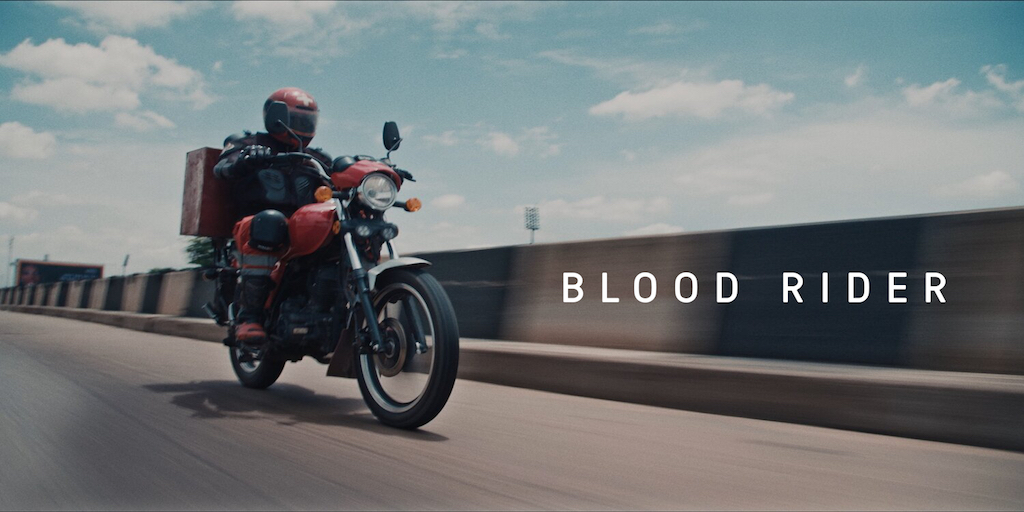Sealed from head to toe in a white ‘hazmat’ suit, hands gloved to the elbows, a respirator covering his entire face; Donovan is at work.
“Forensic cleaning means removal of blood, bone fragments, skin, maggots, flies – everything that a dead body leaves behind. Everything has to disappear by the time I leave”, he explains.
With his long ‘salt-and-pepper’ hair tied up in a ponytail, and his perfectly pressed suit, Donovan cleans crime scenes in Mexico; a vocation he has carried for 20 years, a craft that he has mastered all by himself through the books he has read.
Bereaved families call on his services to clean a bedroom, a lounge, a kitchen, a bathroom. So, like a kind of benevolent phantom, Donovan passes through their lives, allowing them to reconnect with the home and possessions of their loved one, and to properly start to grieve.
“Everytime I leave, the atmosphere lifts”, he says.
Directed by Louise Monlaü
Assistant director: Fernanda Ballesteros
Editing: Julien Demond
Production: Ladybirds Films, The New York Times Op-Docs
Production: Lara Orsoni, Julien Chouvet, Andrew Blackwell, Regina Sobel
Music: Maxence Dussère
Aerial cinematography: Santiago Arau
Sound: José Miguel, Gildas Mercier
Interview
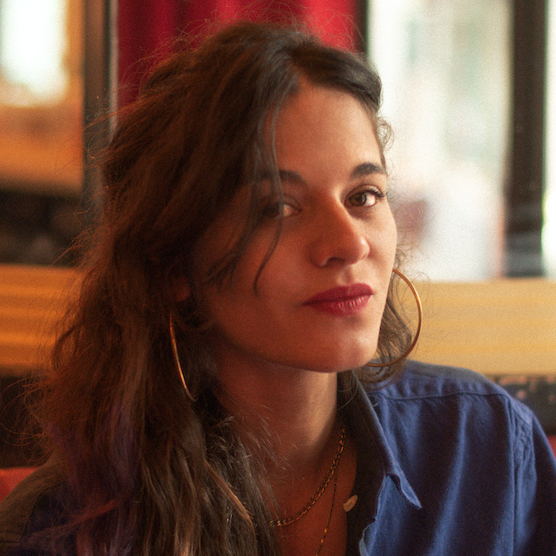
Louise Monlaü Filmmaker
“The seed was set for this project by a phone call and a voice – calm and penetrating. The kind of voice that tells stories, whose melody and tone take you on a journey.”
- Please introduce yourself, Louise.
I was born in Paris and spent most of my childhood there. Aged 7 however, I went to live for three years with my mother in Ouagadougou, Burkina Faso.
It was a fantastic time, my first experience of the world. It was probably from there that stemmed my curiosity for cultures different to my own, my taste for travel and adventure, my incessant need to get off the beaten track and discover new stories.
Afterwards, I did a degree in sociology, economics and political science and then a master’s degree at Science Po Grenoble in International and European Studies. It’s easy to assume that my studies have little to do with the job I do today, but they really set me up well to tackle documentary filmmaking. They gave me a certain journalistic rigour, an analytical framework, and the necessary tools to engage with my subjects, write about them, conduct interviews, etc.
After graduation, I started learning about photography by doing odd jobs and internships related to the world of image and journalism. In 2014, I moved to Mexico City, with the aim of developing stories there. I travelled the country from north to south with my camera and that’s when I started filming!
Photography taught me to frame, to play with light, to build a story. By travelling to many countries, I have been able to immerse myself in many people’s lives, to capture their daily existence. That’s why I film in the same way as I would take a photo: for me, the two disciplines are tightly linked.
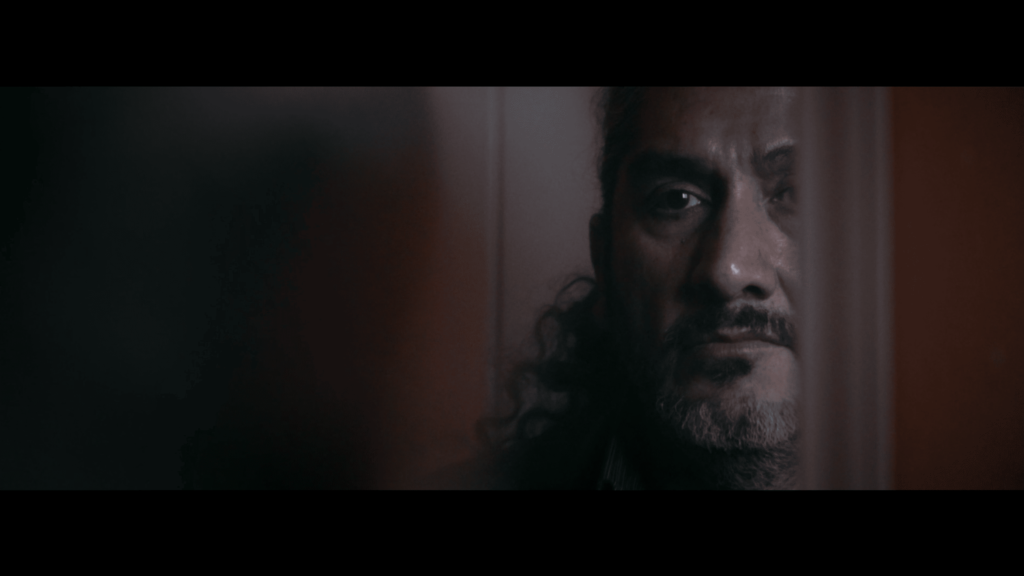
- How was this film born?
The seed was set for this project by a phone call one evening in December 2018, and a voice – calm and penetrating. The kind of voice that tells stories, whose melody and tone take you on a journey. On the other end of the phone was Donovan, whose number I had taken from his Facebook page – a page that bore the ‘no fuss’ title “Donovan Tavera, Mexico City Forensic Cleaner”.
We exchanged a few banalities on the phone and I tried to learn a little more about his work and his life, about his character, but modesty and shyness held us both back. This mysterious ‘communication paralysis’ left me desperate to know more and, two weeks later, I was on the plane to Mexico City.
- How did you feel about filming a “cleaning scene”?
I was scheduled to shoot a “cleaning scene” the same night I first met Donovan. I was wondering what kind of crime we were going to run into, what kind of story, what kind of drama… Will there be a lot of blood? Will there be flies? I started to think about the shooting conditions, the smell…
From the first phone call to my initial meeting with Donovan, everything happened so fast that I didn’t have time to question whether I could stomach filming such shocking situations in such extraordinary circumstances. I didn’t know if I would be physically and psychologically able to handle what I was going to see, feel, touch… all while continuing to film.
The first shooting was difficult that evening. Technically, first of all, because I had to protect myself from all the potentially dangerous bacteria present on the site. I was equipped with a gown and a full face mask which made every movement, indeed every breath, painful and trying. And it was emotionally difficult, especially because of the atmosphere of the place, the palpable presence of the deceased that still hung in the air, and the sadness of the relatives present during the cleaning.
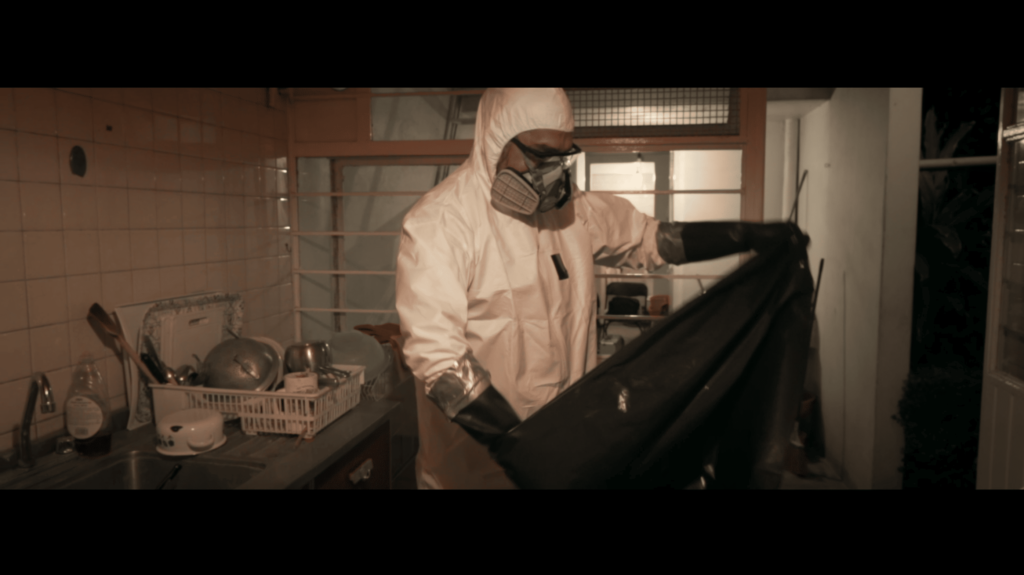
“I wanted to create a feeling of intimacy, of being held tightly, like the sensation of a shared secret.”
- Donovan’s job is unusual, to say the least.
How does this profession really work?
Donovan is contacted directly by bereaved families once the paramedics and police have responded, and more importantly, once the investigation is complete, if there is one. It can take weeks or even months from the time the person dies, most often in tragic circumstances, until the investigation is complete. This can be a very, very long time for the families, who are unable to reclaim the place where the tragedy occurred.
Donovan acts as a kind of liberator, and the families pay him directly. The budget varies according to the number of hours he spends cleaning.
The forensic cleaning profession is perfectly legal. There is a lengthy process that Donovan must follow for each job. He has to apply to the authorities to ensure that the investigation is complete and that he will not compromise any evidence, for example.
- How did Donovan get into this line of work?
Donovan is completely self-taught. He told us that he started by reading chemistry books to learn about different mixtures. He often visits a particular street of antique bookstores in Calle Donceles, in the historic centre of Mexico City. He browses the dusty shelves and lingers for hours in the chemistry section, copying down mixtures, solutions and formulas that seem interesting.
At the back of his house, in a small outdoor courtyard, Donovan has also set up a kind of laboratory, where he does tests… These are his own chemical mixtures that he uses for his cleaning.
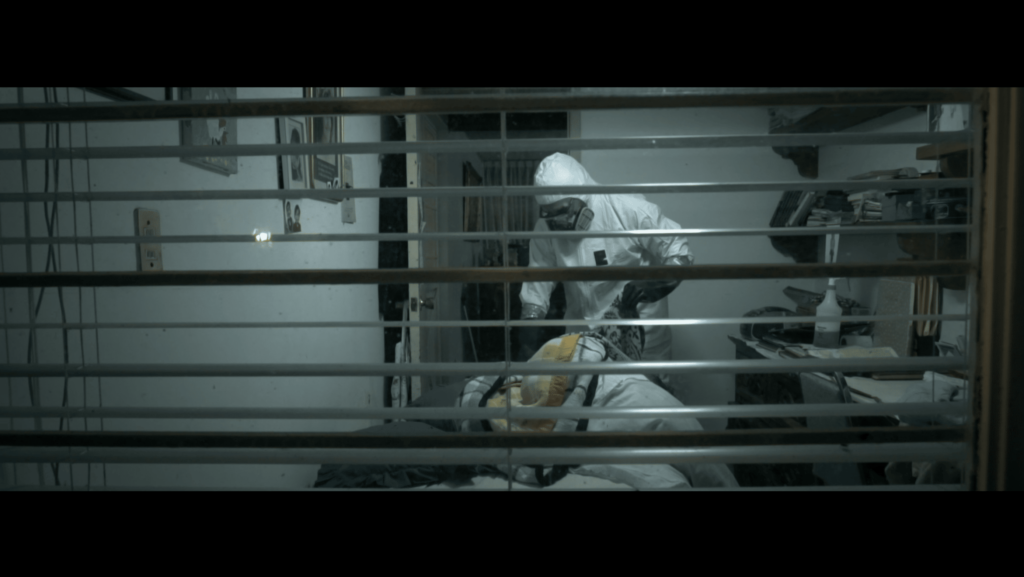
- What is his relationship with death? How does he protect himself from the rigours of it?
Donovan is a very ambiguous man. On the one hand, he has an almost surgical approach to his craft. The way he talks about it, the way he handles his tools, the way he cleans the scenes… You could say he’s almost obsessive.
On the other hand, he is a very spiritual person. But I’m not sure if he is aware of it or if he would own up to it totally. What he reveals to us in the film about his relationship with blood, and his respect for it, or his recurring dream, speaks volumes about his personal involvement and spirituality.
Yet Donovan told us about all of this during breaks in our interviews, despite the fact that the camera was still rolling. He didn’t think these anecdotes were interesting, but I thought they went to the very heart of the film! I asked him if he would allow these passages to be included in the film, as they were touchingly profound. He simply replied: “Yes, but I don’t see why people would be interested…”.
- A large part of the film is shot at night.
Why did you make this aesthetic choice?
There is something fascinating about the night. It is the moment when everything seems possible, a time for the forbidden, for transgression. In the collective imagination, the night is also the playground of criminals. I liked the idea of linking Donovan’s work with this time of crime. One is the result of the other, the two are intrinsically linked.
I also wanted to bring out a kind of strangeness, the same strangeness that I find in Donovan. Filming at night accentuates this strangeness. I wanted the viewer to be held tightly by the night, I wanted to create a feeling of intimacy, like the sensation of a shared secret.
On a more practical note, it turns out that Donovan lives and works at night. He cleans all the crime scenes at night, and usually doesn’t get up until noon. This is what immediately fascinated me about him.
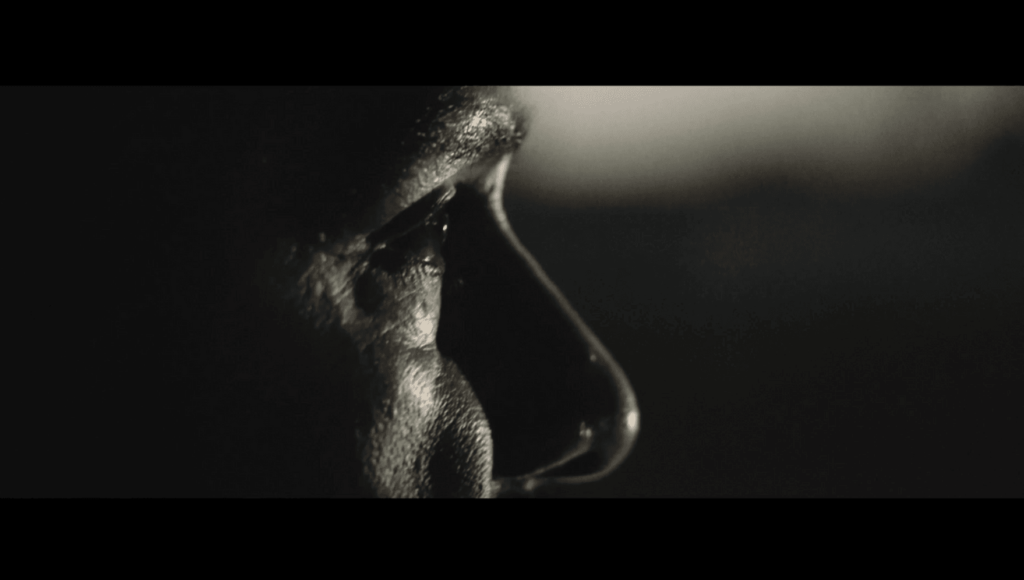
- Can you tell us about the production of the film?
At first, I financed this film completely by myself. I was living in Paris at the time, I had a little money saved up, and on a whim, I went to Mexico City for a month to meet Donovan.
My dream, my goal, was that my film would one day be broadcast on the New York Times Op-Docs platform, except that it was my first film and I had no contact with them!
So I went to Mexico City to do location scouting and shoot a first trailer. Once this one was done, I simply clicked on “pitch your film” on the Op-Docs platform to propose my project, and I waited… six months before getting an answer. And it turned out they were interested! Afterwards, I was supported by the production company Ladybirds Films. I returned to Mexico City for three weeks to finish the film, which was finally sent to the New York Times.
Most of my films are edited by my brother, who has a lot of experience. Working with him at this stage of production is very important to me. With him, I feel free and confident – I dare to test things. Editing is usually a key moment in the creation of a film, and it can be very tricky, so it’s really important for me to feel well surrounded!
- What are your projects at the moment ?
I’m working on a documentary series project and a feature film project. I’m still at the writing stage for both. Since Donovan, my second short film Rocio and me was published on the New Yorker website and I joined up Al Jazeera to make a short film about activist dancers in Lagos, Nigeria! It was an incredible experience!
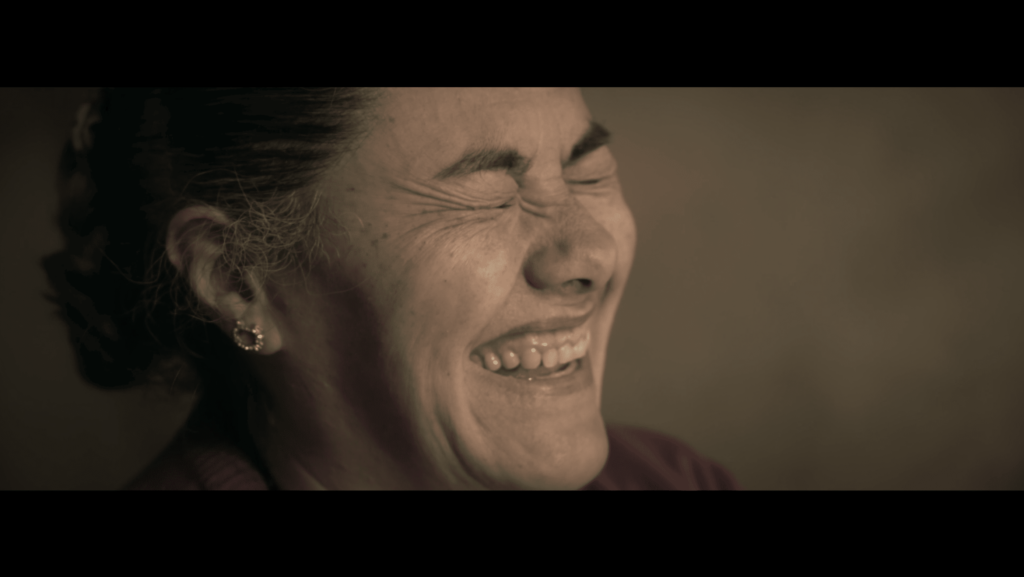
- A word about 99 and the multilingual subtitling of your film?
When I first started directing, I used to watch a lot of the films on the 99 platform. It was a great source of inspiration for me, whether it was the direction, the aesthetics, or the themes! I loved spending time exploring them.
I’m very happy that Donovan has now found its home on the 99 site. 99 is a beautiful project, which helps filmmakers bring their films to life and share them with as many people as possible. While the production and distribution cycles are generally long, and the path to create and bring a film to life is often an obstacle course, the presence of a project such as 99 is a real boon, an important lever for filmmakers.
I love the idea that a multilingual version of Donovan is now available, that it opens up to and addresses other cultures, that it stretches beyond borders and has a more global reach!
- Is there a particular film that you liked on 99?
I really liked Blood Rider. I was preparing my shoot in Nigeria when I came across it! It better allowed me to plan ahead and to get a feel for and begin to understand the place where I was going to go.
In my opinion, it beautifully represents the atmosphere of Lagos, a sprawling city, whose heart beats like no other city in the world. The tension that emanates from this place is quite unique and the film embodies it perfectly in the hair-raising motorcycle scenes. You almost stop breathing! It’s a masterful piece of directing and editing.

